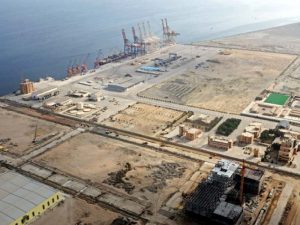China is pushed to expedite projects.
Delays could lead to the train infrastructure collapsing and harm 3,100MW power plans.

Pakistan urged China on Thursday to expedite five projects totaling $18.5 billion because it believed that any additional delays would lead to the collapse of the rail system in a year and would postpone the production of 3,100 megawatts of electricity.
Ahsan Iqbal, the planning and development minister, made the appeal at the 11th Joint Cooperation Committee (JCC) meeting. Iqbal has presided over eight of the 11 JCC meetings.
Without making any new announcements, the JCC meeting for the China-Pakistan Economic Corridor (CPEC) talked about “missed opportunities” and “prolonged delays” in the implementation of plans made eight years ago.
Vice Chairman Lin Nianxiu of the National Development and Reform Commission (NDRC) and Ahsan Iqbal served as co-chairs of the conference.
According to representatives present at the meeting, Islamabad asked Beijing to give priority consideration to the $10 billion Mainline-I railway project, the $1.2 billion Karachi Circular Railway project, the $1.6 billion Azad Pattan hydropower project, the $2.5 billion Kohala power project, and the $3 billion Thar Block-I coal project.
An official stated, “These projects are facing years of delay due to barriers from both sides.”
The planning minister also reminded China to take Pakistan’s request into account when deciding whether to relocate the $584 million Gwadar power plant.
The minister emphasised the potential that was lost, particularly Pakistan’s reluctance to utilize Chinese expertise to create Special Economic Zones.
He also mentioned the “prolonged delays” in project implementation while pleading with the Chinese for assistance in saving Pakistan’s rail system.
The 11th JCC minutes have not been approved by the government, and the official announcement of the outcome will be made when Prime Minister Shehbaz Sharif travels to China, according to the minister. On November 1, “the PM will go on a two-day visit.”
According to a diplomatic source, during the PM’s visit, various projects in the infrastructure and energy sectors were anticipated to make fresh advancements. Similar arrangements will be created to make it easier for particular agricultural products to be exported to China. There will also be the signing of memorandums of understanding (MoUs) for cooperation in information technology, SEZs, and security capacity building. Ahsan Iqbal said, “Had we revealed the JCC choices, it would have stolen the thunder of PM’s visit.
Since its inception in 2013, 28 projects totaling $18.8 billion have been completed, and there are currently 34 plans worth $34 billion either in various phases of implementation or planned.
Iqbal warned the vice chairman of the NDRC, “If we don’t start the ML-I project right once, the mainline of Pakistan Railways will probably collapse within a year.”
He continued by saying that Pakistan Railways had not invested in the project since China included the ML-I project in the CPEC fold.
According to the planning minister, Pakistan last week boosted the project’s cost to $10 billion, a 45% increase, in response to Chinese demand.
Iqbal urged China to approve the commercial contract, saying that doing so would “open the door for the signing of a financing arrangement for the ML-I project.”
According to the minister, China has acknowledged the significance of initiating construction on Mainline-I and the Karachi Circular Railway.
Iqbal stated following the meeting that the government had examined the status of the ongoing programmes’ implementation and had determined new areas for collaboration.
Pakistan reiterated that it will address the problems experienced by the Chinese independent power producers while assuring China that it remained committed to the tax and tariff regulations established under the CPEC framework.
The execution of three projects with a combined generation capacity of 3,100 MW was beset by “prolonged delays,” according to the minister. He pleaded with China to complete their financial agreements as soon as possible.
Pakistan asked China for assistance to speed up construction on the $2.5 billion Kohala hydropower project and the $1.6 billion Azad Pattan hydropower project. The $3 billion, 1,320 MW Thar Block-I project’s financial close is still pending.
However, Pakistan should be held accountable for the delay because it was unable to comply with a requirement of the fundamental agreement—opening a bank account—to protect Chinese energy companies from spiralling debt.
Pakistan pleaded with China to consider other choices for the 300 MW imported coal-fired power station, pointing out that the cost of imported coal was much higher and that the Gwadar authorities also desired to implement rigorous environmental regulations.
However, Pakistan asked China to help finance a new transmission line to provide a steady supply between Hub and Gwadar.
Pakistan “had not been able to replicate Chinese experience in the SEZ domain,” the planning minister said.









































